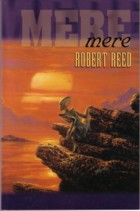 Golden Gryphon Press, 2004
Golden Gryphon Press, 2004
Very few science fiction stories are told in where there is no human element. While Robert Reed‘s "Mere" does technically contain a human, the title character is human in genetic makeup only. The novelette opens with an incredible ship making an eons long journey. When the ship meets disaster and everyone aboard is killed, the ship reconfigures itself to act as an incubator for a fetus it has managed to rescue until it can deposit the fetus on an alien world.
Mere, that fetus grown into a woman, is raised by the local indigenes, the Tilan, who revere her as a god, as much for her biological differences as for the story of her arrival and the immortality which she seems to possess. Although Reed examines Mere’s relationship with her worshippers and the strange cult that spring up around her, he seems more interested in using her as the focal point to explore the world on which she found herself.
Because of the chronological span of the story, Reed can only touch on aspects of Mere’s life, which gives the book a disassociated feel. The sense of wonder essential to so much science fiction is clearly in evidence, but the reader has a hard time connecting with Mere as a person and the individual Tila come and go so quickly that "Mere" lacks any emotional bonds there as well.